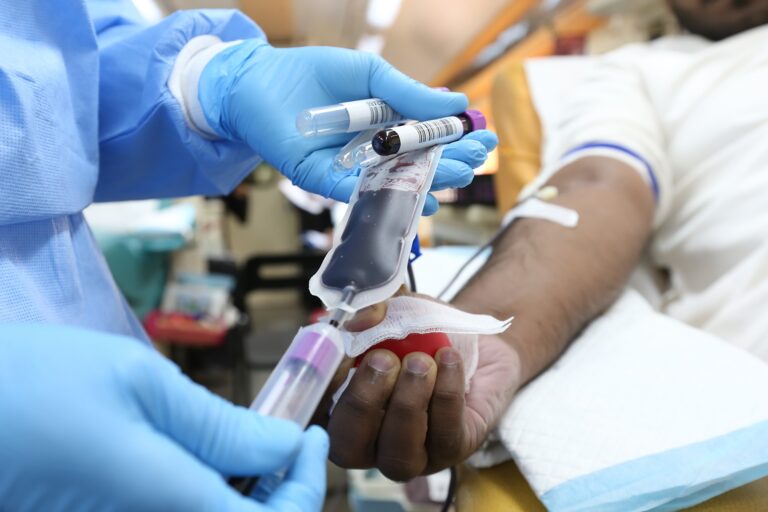Donating blood is not only a generous act that saves lives but also offers several health benefits for donors. Regular blood donation can improve overall health, reduce the risk of certain diseases, and provide a sense of well-being. This article explores the numerous health benefits of donating blood, making it a win-win for both recipients and donors.
Physical Health Benefits
Maintaining Healthy Iron Levels
Donating blood helps regulate iron levels in the body. High iron levels can lead to conditions like hemochromatosis, which can cause damage to organs such as the liver and heart. Regular blood donation helps remove excess iron, reducing the risk of iron overload and promoting better organ health.
Stimulating Blood Cell Production
After donating blood, the body works to replenish the lost blood. This process stimulates the production of new blood cells, which can improve overall blood circulation and cardiovascular health. Regular blood donation helps keep the circulatory system functioning optimally.
Lowering the Risk of Heart Disease
Some studies suggest that regular blood donation can lower the risk of heart disease by reducing iron levels in the blood. High iron levels are associated with an increased risk of cardiovascular issues, so maintaining balanced iron levels through blood donation can contribute to heart health.
Psychological Benefits
Sense of Fulfillment and Purpose
Donating blood provides a sense of fulfillment and purpose, knowing that you are making a positive difference in someone’s life. This act of kindness can enhance mental well-being and promote a positive outlook.
Reducing Stress and Anxiety
Helping others through blood donation can reduce stress and anxiety. The act of giving and knowing that you are contributing to the greater good can provide emotional satisfaction and improve overall mental health.
Building Social Connections
Participating in blood donation drives and community events can help build social connections and a sense of belonging. Engaging with others who share similar values and goals can enhance social well-being and create a supportive community network.
Community Health Benefits
Supporting Healthcare Systems
Regular blood donations contribute to a stable blood supply, ensuring that hospitals and clinics have the necessary resources to treat patients. This collective effort supports healthcare systems and improves their ability to respond to medical emergencies and chronic health issues.
Enhancing Public Health
Blood donation programs play a crucial role in enhancing public health by ensuring that there is a steady supply of safe blood available for those in need. This availability helps reduce mortality rates and improve health outcomes for patients requiring blood transfusions.
Promoting a Culture of Giving
Blood donation fosters a culture of giving and volunteerism within communities. This culture can extend to other areas of public health and social support, creating a more compassionate and resilient society.
Debunking Myths About Blood Donation
Myth: Blood Donation is Painful
Fact: The process of donating blood is quick and relatively painless. Most donors experience only a brief pinch during needle insertion, and the entire process typically takes less than an hour.
Myth: Blood Donation is Time-Consuming
Fact: The entire blood donation process, including registration, screening, donation, and post-donation refreshments, usually takes less than an hour. Many donation centers offer convenient appointment times to fit into busy schedules.
Myth: Donating Blood is Unhealthy
Fact: Donating blood is safe for healthy individuals and can offer health benefits, such as reduced iron levels and improved cardiovascular health. Blood donation is carefully regulated to ensure donor safety.
Encouraging Blood Donation
Educating the Public
Providing accurate information and education about the benefits and safety of blood donation is essential for encouraging more people to donate. Community outreach programs, social media campaigns, and educational materials can help dispel myths and promote the importance of blood donation.
Making Blood Donation Convenient
Ensuring that blood donation is convenient and accessible can increase donor participation. Mobile blood donation units, extended donation hours, and community-based donation drives can make it easier for people to donate.
Recognizing and Rewarding Donors
Recognizing and rewarding donors can encourage repeat donations and build a culture of giving. Certificates, public acknowledgments, and small incentives can show appreciation for donors’ contributions and motivate others to donate.
Conclusion
Blood donation is a win-win for both recipients and donors, offering numerous health benefits and contributing to overall community well-being. Regular blood donation helps maintain healthy iron levels, stimulate blood cell production, and reduce the risk of heart disease. It also provides psychological benefits, such as a sense of fulfillment and reduced stress. By supporting healthcare systems and promoting a culture of giving, blood donation plays a crucial role in enhancing public health. Consider becoming a regular blood donor and encouraging others to do the same




